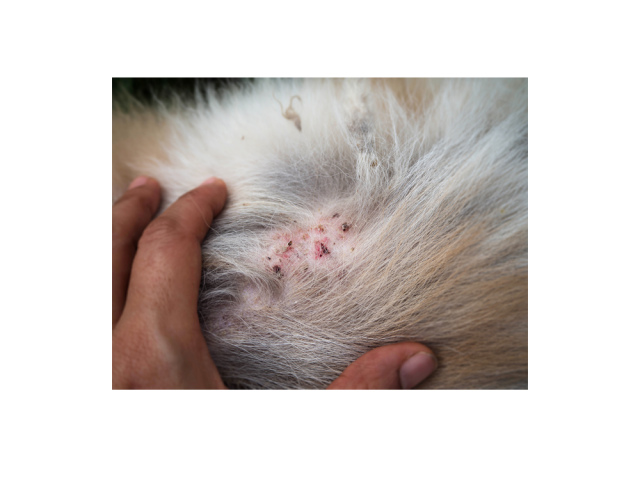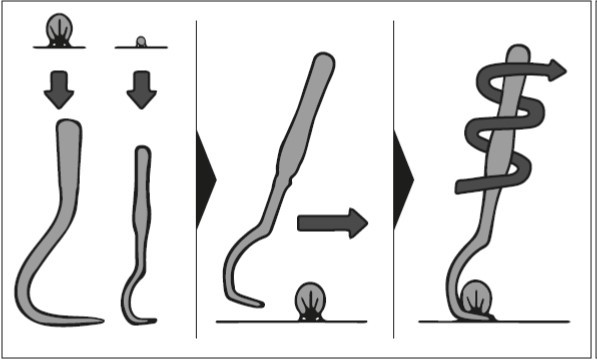
Parasites
Why is it important to protect my pet from external parasites?
Fleas and ticks are the most common parasites. Approximately 40% of dogs and 60% of cats are infested with external parasites from spring to autumn, and 20% remain infested over the winter. Depending on your pet’s lifestyle or in case of allergy to flea bites, your veterinary surgeon may recommend regular treatment, even in winter.
Adult fleas lay 50 eggs a day, which are dispersed into the environment by your pet. Most fleas are therefore found in the environment: the eggs, larvae and nymphs. It is therefore essential to treat your pet, other animals and also your home.
Fleas can cause an allergy (Flea Allergy Dermatitis: F.A.D.) and carry intestinal worms. Ticks can transmit several diseases, some of which can be fatal, such as piroplasmosis. It is therefore important to treat your pet regularly to minimise the risk of transmission of these diseases.
Does my pet have fleas?
It is not always easy to determine whether your dog or cat has fleas. Cats often have no clinical symptoms when infested, and cause infestation of the environment. To find out if your pet has fleas, you can:

Check for flea excrement, which is dark red in colour. Once again, you should use a fine comb, run it over your pet’s coat, then collect any debris on a white piece of kitchen roll. Sprinkle a small amount of water onto the kitchen roll. If the debris contains flea excrement, the moisture will cause a red ring to form around the debris (undigested blood).
Even with these two methods, it can sometimes be impossible to find fleas or excrement on affected pets, as they groom themselves regularly. Hence, if in doubt, see your veterinary surgeon, who will prescribe suitable treatment if necessary.
I have found fleas on my pet! What should I do?
First of all, if your pet has other clinical symptoms (redness, lesions, hair loss, etc.), do not hesitate to see your veterinary surgeon.
If you find fleas on your pet, it is likely that the infestation is severe and both the environment and other pets will have been contaminated.
In this case, external parasites should be targeted in three stages:
- First of all, treat your pet using a veterinary medicine. Numerous solutions are available in stores (spot-on pipettes, collars, shampoos, etc.), whereas others (tablets) are only available from your veterinary surgeon. Follow the dose recommended in the package leaflet or prescribed by your veterinary surgeon.
- Also treat other pets in your home (dogs, cats, rabbits, etc.). NB: it is important to use an antiparasitic product suited to each animal (for example, do not use an antiparasitic product for dogs on cats).
- Treat the environment: rooms out of bounds to your pets should also be treated, as fleas readily spread throughout the environment. Francodex offers several solutions adapted to each situation (spray, aerosol, diffuser).
I have found a tick on my pet! What should I do?
Even if your pet has already had their antiparasitic treatment, it is essential to remove ticks immediately. Unless they are dead, ticks can still transmit disease.
The best method is to use a tick remover tool to detach them from your pet. Choose the tick remover with a size suited to the tick to be removed, then separate the hair and slide the tool between your pet’s skin and the tick. Rotate several times in the same direction, without pulling, until the tick releases its hold. After removing the tick, disinfect the bite site and wash your hands carefully.

Things to avoid: you must not pull on the tick (otherwise the tick’s head could remain in the skin), squeeze the tick with your fingers or tweezers (risk of regurgitation, which can transmit disease), apply any substances to the tick (ether, alcohol, disinfectant, etc.) or burn it with a cigarette (which also causes regurgitation).
Choosing an antiparasitic product
- Spot-on pipettes are practical to use and can be applied to several areas on large dogs.
- Sprays are recommended for massive infestation, as they rapidly cover the body surface area and immediately come into contact with the parasites.
- Collars are beneficial due to their long lasting action.
- Shampoos are useful for severe infestation, but wait 48 hours after shampooing before applying a spot-on pipette, to allow sebum to form.










